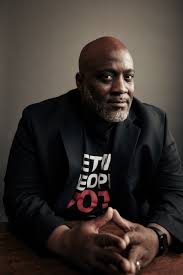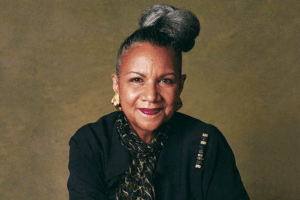By Joshua Levi Perrin
American democracy, like an intricate quilt, is stitched together by the diverse experiences and voices of its people. The right to vote is one of those vital patches, symbolizing our collective power and individual agency. Yet, for many who have served their time and reentered society, this essential right remains out of reach.
Across the nation, in states like Florida, Pennsylvania, Michigan, Wisconsin, Virginia, Arizona, Nevada, and Georgia, formerly incarcerated individuals face significant barriers to reintegration into civic life. Each of these states, with its unique political landscape, is a critical battleground and will play a significant role in shaping the country’s future.
The ongoing efforts to restore voting rights light the way toward a future where every voice is heard, every vote counts, and every person can fully participate in our nation’s life. There is hope, thanks to a movement led by Sheena and Desmond Meade, who are championing the Clean Slate Initiative and The Florida Rights Restoration Coalition (FRRC), respectively. Their organizations are committed to restoring dignity and full citizenship to those who have been disenfranchised.
A Patchwork of Policies: The Landscape of Disenfranchisement
The barriers to voting for formerly incarcerated people vary widely from state to state, creating a confusing and often daunting landscape. According to data from ProCon.org, these disparities reflect a patchwork of policies rooted in historical, political, and social factors.
Only two states – Maine and Vermont – impose no barriers on formerly incarcerated people who can cast a ballot whether in prison or parole.
In Florida, notorious for purging Black voters from the rolls, the fault lines cracked with a state constitutional amendment in 2018 advanced by the FRRC,promising to restore voting rights to most people convicted of felonies upon completion of their sentences. However, this victory has been thwarted by the Republican-dominated state legislature which imposed a web of new barriers, such as paying all court costs and fines, effectively imposing a 21st Century poll tax. This has left many Floridians in limbo, eager to exercise their right to vote but hamstrung by financial burdens and fearful of prosecution if they attempt to register.
Pennsylvania and Michigan – both considered critical battleground territory – automatically restore voting rights upon release from prison. Yet, lack of awareness and administrative hurdles often mean that millions of eligible voters remain disenfranchised. Similarly, in Wisconsin, while the law mandates the restoration of voting rights upon completion of parole or probation, the state does not actively inform individuals of their eligibility, leading to confusion and under-participation.
In Virginia, the governor has the power to restore voting rights, but the process is complex and discretionary, leaving many hopefuls waiting anxiously for their applications to be reviewed. Arizona’s policy is more restrictive, requiring individuals with multiple felony convictions to petition the court for rights restoration—a process that can be both costly and time-consuming.
Nevada recently reformed its laws to restore voting rights to most individuals upon release from prison. However, similar to other states, the implementation of these reforms has been inconsistent, leading to a gap between policy and practice. In Georgia, individuals can vote once they have completed their sentence parole and probation. Yet, the lack of clarity and support from state agencies often results in countless returning citizens being left behind.
The Power of the Clean Slate Initiative and Grassroots Mobilization


Sheena Meade, CEO of The Clean Slate Initiative
Amid the complex and often discouraging landscape that denies formerly incarcerated people a second chance, the Clean Slate Initiative stands out as a transformative force for justice and inclusion. Spearheaded by visionary leader Sheena Meade, the initiative is committed to dismantling the barriers that prevent millions of Americans from fully participating in civic life. Their mission is dedicated to creating a fairer and more just society where everyone has the opportunity to rebuild their lives after serving their time.
The Clean Slate Initiative works to automate the process of clearing criminal records, ensuring that people with past convictions can seize opportunities that were previously out of reach. This includes access to employment, housing, and education—critical factors in successful reintegration into society. By advocating for policies that automatically expunge or seal criminal records, the Clean Slate also removes the stigma and legal barriers that keep people from fully contributing to their communities.
However, the impact of the Clean Slate Initiative goes beyond policy. It is about changing the narrative around those with criminal records, emphasizing dignity, redemption, and empowerment. As Sheena Meade highlighted during her recent speech at the Democratic National Convention, societal attitudes cannot shift if we continue to define people by their past mistakes. The initiative’s commitment to racial equity and narrative change underscores the importance of recognizing the humanity of individuals behind the records. This approach has already led to significant successes, such as the groundbreaking policy in Pennsylvania and the clearing of a million records on the first day of implementation in Michigan.
“The work we do isn’t a one-size-fits-all policy,” Meade explains. “Clean slate laws must be tailored to each state’s unique legal landscape. Many states already have laws that allow for record clearance, but only a small fraction of eligible people pursue it due to the bureaucratic challenges. Our approach is to meet each state where it is. We assess the technical feasibility of automating record clearance, understand the political climate, and work within the existing policy framework.”
The Clean Slate Initiative is more than just a policy movement; it is a beacon of hope for millions, offering a path to redemption and a second chance at life.
Desmond Meade, Executive Director of the Florida Rights Restoration Coalition
Desmond Meade’s story is one of resilience, redemption, and an unwavering belief in the power of grassroots activism. A man who once walked out of prison still reeling from the effect of being stripped of his autonomy, formerly homeless and among America’s “underclass,” Meade has created a powerful movement that has transformed the face of democracy in Florida.
His journey from the depths of despair—substance user, unhoused and on the brink of suicide—to the heights of political influence is a testament to the bounds of the human spirit.
Meade, a recipient of the prestigious McArthur “genius award” and a law degree, built a grassroots movement in Florida rooted in a simple yet profound mission: to restore voting rights to the over one million Floridians who, like him, had been disenfranchised due to felony convictions.
Crisscrossing the state, speaking at churches, community centers and street corners, Meade galvanized a movement that transcended political divides. His tireless efforts culminated in the passage of Amendment 4 in 2018, a historic victory that restored voting rights to 1.4 million Floridians. This was not just a policy win; it was a triumph of hope over cynicism, of grassroots power over entrenched systems of exclusion.
A Vision for the Future
The journey to restore voting rights for formerly incarcerated people is far from over. It requires not only legal and policy changes but also a shift in societal attitudes.
By empowering more citizens to vote nationwide, the voice of the voiceless can influence the balance of power nationally and in state-level politicies.As we reflect on the stories of resilience and determination that characterize this movement, we are reminded of the enduring promise of democracy—a promise that extends to every citizen, regardless of their past. By breaking down the barriers to voting, we are not only restoring rights but also renewing our commitment to a more inclusive and just society.
Joshua Levi Perrin is a writer for Unerased | Black Women Speak and senior communications manager for the Center for the Study of Social Policy.





